
Resources
Browse our full library of in-depth resources and publications
The PacWastePlus programme team is committed to producing meaningful and valuable publications and resources that provides guidance for improving waste management in the Pacific
Search
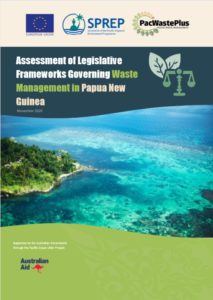
Waste Legislative Review
Assessment of Legislative Frameworks Governing Waste Management in Papua New Guinea
These assessments have been prepared by SPREP EU-funded PacWastePlus programme, drawing upon reporting developed by the University of Melbourne (UoM) on behalf of PacWastePlus for that programme’s Waste Legislative Review project. The UoM team reviewed legislation relevant to waste management in 14 Pacific region countries and Timor-Leste. Separate assessments are provided for each of the PacWastePlus participating countries. This report provides a detailed view of the legislative environment governing waste management currently in operation in Papua New Guinea.
File Size: 4.8MB, 62 pages PDF document
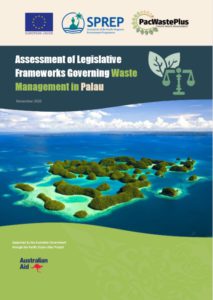
Waste Legislative Review
Assessment of Legislative Frameworks Governing Waste Management in Palau
These assessments have been prepared by SPREP EU-funded PacWastePlus programme, drawing upon reporting developed by the University of Melbourne (UoM) on behalf of PacWastePlus for that programme’s Waste Legislative Review project. The UoM team reviewed legislation relevant to waste management in 14 Pacific region countries and Timor-Leste. Separate assessments are provided for each of the PacWastePlus participating countries. This report provides a detailed view of the legislative environment governing waste management currently in operation in Palau.
File Size: 4.8MB, 62 pages PDF document
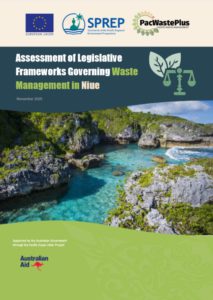
Waste Legislative Review
Assessment of Legislative Frameworks Governing Waste Management in Niue
These assessments have been prepared by SPREP EU-funded PacWastePlus programme, drawing upon reporting developed by the University of Melbourne (UoM) on behalf of PacWastePlus for that programme’s Waste Legislative Review project. The UoM team reviewed legislation relevant to waste management in 14 Pacific region countries and Timor-Leste. Separate assessments are provided for each of the PacWastePlus participating countries. This report provides a detailed view of the legislative environment governing waste management currently in operation in Niue.
File Size: 4.7MB, 58 pages PDF document
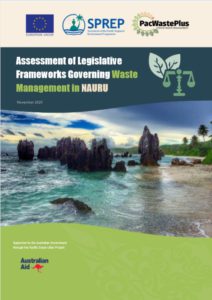
Waste Legislative Review
Assessment of Legislative Frameworks Governing Waste Management in Nauru
Document Description: These assessments have been prepared by SPREP EU-funded PacWastePlus programme, drawing upon reporting developed by the University of Melbourne (UoM) on behalf of PacWastePlus for that programme’s Waste Legislative Review project. The UoM team reviewed legislation relevant to waste management in 14 Pacific region countries and Timor-Leste. Separate assessments are provided for each of the PacWastePlus participating countries. This report provides a detailed view of the legislative environment governing waste management currently in operation in Kiribati.
File Size: 3.0MB, 60 pages PDF document
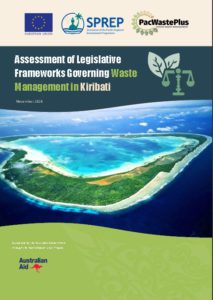
Waste Legislative Review
Assessment of Legislative Frameworks Governing Waste Management in Kiribati
Document Description: These assessments have been prepared by SPREP EU-funded PacWastePlus programme, drawing upon reporting developed by the University of Melbourne (UoM) on behalf of PacWastePlus for that programme’s Waste Legislative Review project. The UoM team reviewed legislation relevant to waste management in 14 Pacific region countries and Timor-Leste. Separate assessments are provided for each of the PacWastePlus participating countries. This report provides a detailed view of the legislative environment governing waste management currently in operation in Kiribati.
File Size: 3.0MB, 60 pages PDF document
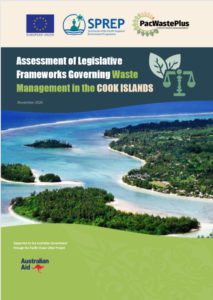
Waste Legislative Review
Assessment of Legislative Frameworks Governing Waste Management in the Cook Islands
These assessments have been prepared by SPREP EU-funded PacWastePlus programme, drawing upon reporting developed by the University of Melbourne (UoM) on behalf of PacWastePlus for that programme’s Waste Legislative Review project. The UoM team reviewed legislation relevant to waste management in 14 Pacific region countries and Timor-Leste. Separate assessments are provided for each of the PacWastePlus participating countries. This report provides a detailed view of the legislative environment governing waste management currently in operation in the Cook Islands.
File Size: 4.0MB, 58 pages PDF document
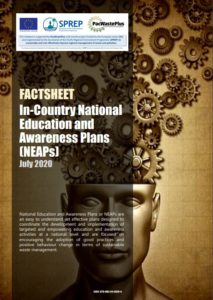
Factsheet
In-Country National Education and Awareness Plans (NEAPs)
National Education and Awareness Plans or NEAPs are easy to understand yet effective plans designed to coordinate the development and implementation of targeted and empowering education and awareness
activities at a national level and are focused on encouraging the adoption of good practices and positive behaviour change in terms of sustainable waste management. This factsheet provides guidance to participating PacWastePlus countries on basic steps to develop their education and awareness plans around their in-country projects.
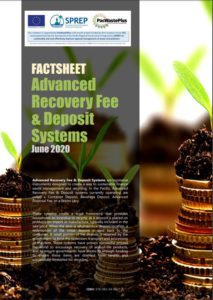
Factsheet
Advanced Recovery Fee & Deposit Systems
Advanced Recovery Fee & Deposit Systems are legislative instruments designed to create a way to sustainably finance waste management and recycling. In the Pacific, Advanced Recovery Fee & Deposit systems currently operating are called a Container Deposit, Beverage Deposit, Advanced Disposal Fee, or a Waste Levy. These systems create a legal framework that provides households an incentive to recycle, as a deposit is placed on products on import or manufacture, typically included in the sale price. When the item is returned to a deposit location, a redemption of the initial deposit is paid back to the consumer. A small portion of the deposit is retained by the government to fund the collection, transport and processing of the item. These systems have proven successful around the world to encourage recovery of end-of-life products,
and to ensure governments have access to enough funding to ensure these items are diverted from landfills and successfully recovered for recycling.
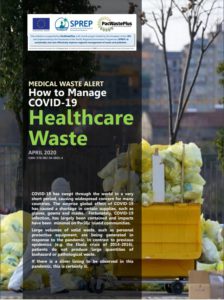
Factsheet
Medical Waste Alert: How to Manage COVID-19 Healthcare Waste
COVID-19 has swept through the world in a very short period, causing widespread concern for many countries. The surprise global effect of COVID-19 has caused a shortage in certain supplies, such as gloves, gowns, and masks. Fortunately, COVID-19 infection has largely been contained and impacts have been minimal on Pacific Island communities. Large volumes of solid waste, such as personal protective equipment, are being generated in response to the pandemic. In contrast to previous epidemics (e.g. the Ebola crisis of 2014-2016), patients do not produce large quantities of biohazard or pathological waste. If there is a silver lining to be observed in this pandemic, this is certainly it. This medical waste alert provides useful information on how to Manage COVID-19 Healthcare Waste.
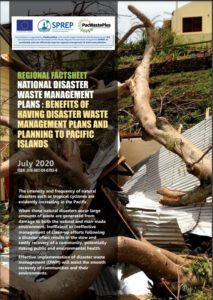
Factsheet
National disaster Waste Management Plans: Benefits of having disaster waste management plans and planning to Pacific islands
The intensity and frequency of natural disasters such as tropical cyclones are evidently increasing in the Pacific. When these natural disasters occur large amounts of waste are generated from damage to both the natural and man-made environment. Inefficient or ineffective management of clean-up efforts following a disaster often results in the slow and costly recovery of a community, potentially risking public and environmental health.
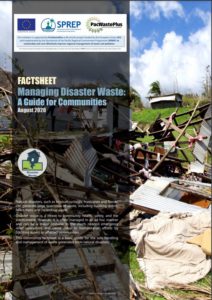
Factsheet
Managing Disaster Waste: A Guide for Communities
Natural disasters, such as tropical cyclones, hurricanes, and floods, can generate large quantities of waste, including building debris, fallen trees, and hazardous waste. Disaster waste is a threat to community health, safety, and the environment. However, it is often managed in an ad hoc manner and can be a major obstacle to the much-needed emergency relief operations and cause delay to humanitarian efforts by blocking access to affected communities.
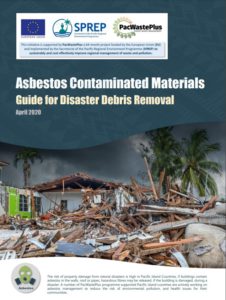
Booklet
Asbestos Contaminated Materials Guide for Disaster Debris Removal
The risk of property damage from natural disasters is high in Pacific Island Countries, if buildings contain asbestos in the walls, roof or pipes, hazardous fibres may be released, if the building is damaged, during a
disaster. A number of PacWastePlus programme supported by Pacific island countries are actively working on asbestos management to reduce the risk of environmental pollution, and health issues for their communities. This document is designed to provide guidance on response and management, and to supplement knowledge and skills – utilising this guide does not imply qualifications, and we strongly recommend
undertaking appropriate training and employing necessary protective measures prior to handling asbestos-containing materials.
Newsletter Subscription
Would you like to subscribe to our quarterly programme newsletter-The Connection?
We care about the protection of your data. Read our Privacy Policy.
Newsletter Signup
To sign up to our newsletter, enter the information below and we will add you to our mailing list for all future regional and project updates.
